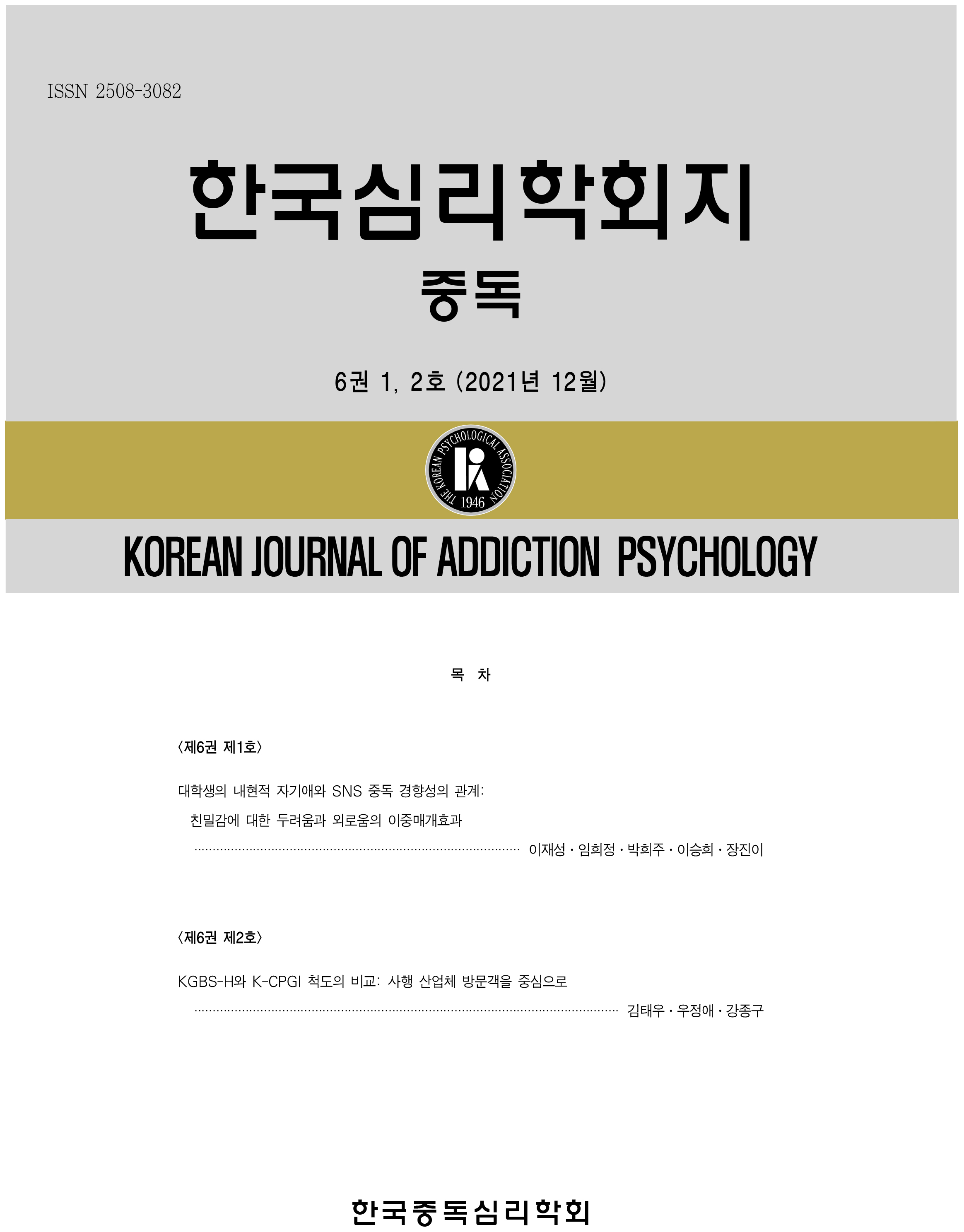Korean Journal of Addiction Psychology
- Log In/Sign Up
- P-ISSN2508-3082
 ISSN : 2508-3082
ISSN : 2508-3082
Vol.7 No.2
Abstract
The purpose of this study is to derive the positive effects of game activities by revealing the relationship between the form of game use and self-regulation of college students, and to promote the formation of a sound game culture by inducing good use of game. To this end, a survey was conducted on 128 college and graduate students to measure “metacognition”, “self-regulation”, “good use of games”, “problematic game use”, and “game time”. Factor analysis was conducted to construct variables to be introduced into the model. Through factor analysis, two factors of [regulation management] and [planning check] were identified in ‘metacognition’, and three factors of [action control], [emotion control], and [performance control] were identified in ‘self-regulation’. In ‘good use of games’, three factors of [expansion of positive effects], [expansion of social network], and [reinforcement of control], and in ‘use of problematic games’, two factors of [uncontrollability] and [inducing side effects] each was extracted respectively. As a result of structural equation model analysis to verify the three research hypotheses, the effect index from ‘metacognition’ to ‘self-regulation’ was significant (p<.001). Also, a significant result was found in the indirect effect from ‘metacognition’ to ‘game time’ via ‘self-regulation’ (p<.05). In addition, in ‘self-regulation’, a positive effect was shown for ‘good use of games’ and a negative effect for ‘problematic use’. There was also a significant difference in the total indirect effect of ‘self-regulation’ obtained through ‘good use of games’ and ‘problematic use’ (p<.05). Finally, there was a significant difference in the correlation between ‘good use of games’ and ‘problematic use’, and all three research hypotheses established in this study were verified. These results can be interpreted as suggesting that metacognition-activated self-regulation is a variable that will inhibit problematic game use and at the same time lead game selection.
Abstract
The objective of this study is to explore the 9th step practice experience for A.A. participants with Alcohol Use Disorder. To this objective, 10 subjects participated in the study, who have been attending A.A. and maintaining sobriety over 10 years. Data were collected by use of in-depth interviews. The collected data were analyzed using Colaizzi’s phenomenological method, and derived 190 concepts, 55 themes, and 20 theme clusters. The results are ‘Addicted by illness’, ‘Focus on A.A. to live’, ‘Experiencing love, trust and hope in A.A.’, ‘Feeling the need for making amends with fear of relapse and hope for a new life’, ‘Postpone making amends while feeling anger and fear‘, ‘Being stuck in the past due to unfinished amends’, ‘Realize that making amends don’t solve all problems’, ‘Careful not to fall into pride while practicing the ninth step’, ‘Focus on only my problems with a humble attitude’, ‘The resentment and guilt that weighed on my heart was lifted, and the light came inside’, ‘Attitude toward the world has changed in a positive way’, ‘Realize what I have done wrong exactly’, ‘Being proud of myself and others’, ‘Experiencing forgiveness and encountering God while pleading in prayer’, ‘Being respected by putting myself first’, ‘Experiencing the family who felt my change, pouring out the pain they had endured’, ‘The relationship with family deepens’, ‘Feeling that the reward can never be completed’, ‘Constantly practicing making amends’, ‘As recovery progresses, the amends area expands and matures’. The result is significantly useful in understanding clients in addiction treatment fields.
Abstract
Ecological momentary assessment (EMA) allows subjects to report on their drinking experiences in a natural environment and may improve our understanding of the subjects’ alcohol use more than experimental or retrospective studies can. EMA has been widely used in studies of alcohol use in other countries, but few EMA studies in the alcohol field exist in Korea. In this study, we aimed to explore and examine the most frequently studied topics and findings and how EMA was used in each study. Recent research has used EMA to examine alcohol-related variables, such as affect, drinking motivation, alcohol cravings, environmental factors, and biomarkers for alcohol use. The studies on affect have focused on negative affect, positive affect, and affective instability, and studies on drinking motivation have been conducted based on the theory of the four motivational models of alcohol use. The studies on alcohol cravings observed participants’ drinking behaviors after being exposed to alcohol-related cues and examined the 24-hour rhythm of alcohol cravings. The studies on environmental factors concerned the location of drinking and the presence of drinking companions. Finally, studies on biomarkers related to alcohol use have used estimated blood alcohol concentration, electrodermal activity, and heart rate variability. Based on these results, the necessity and future directions of EMA considering domestic drinking culture and characteristics have been suggested.